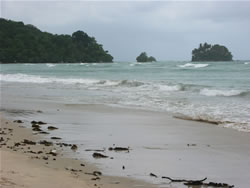Important CDC Findings Published on the Mental Health of People in Tsunami-Affected Areas in Southern Thailand
August 2, 2006
NOTE: This document is provided for historical purposes only and may not provide our most accurate and up-to-date information. The most current disaster information can be found on the CDC Natural Disasters and Severe Weather homepage.
On August 2, 2006, two CDC-led studies were published in the Journal of the American Medical Association dealing with the effects of the December 2004 South Asia tsunami on people in affected areas of Southern Thailand. CDC is highly committed to promoting mental health as part of its overall public health efforts and we believe these studies make important contributions to the field of post-disaster epidemiology and intervention. The findings of these two studies, which are summarized below, will help CDC better direct, strengthen, and evaluate mental health needs and interventions when responding to future disasters.
Symptoms of posttraumatic stress disorder and depression among children in tsunami-affected areas in southern Thailand
Thienkrua W, Cardozo BL, Chakkraband ML, Guadamuz TE, Pengjuntr W, Tantipiwatanaskul P, Sakornsatian S, Ekassawin S, Panyayong B, Varangrat A, Tappero JW, Schreiber M, van Griensven F; Thailand Post-Tsunami Mental Health Study Group. JAMA. 2006 Aug 2;296(5):549-559.
 Approximately 20,000 children were directly affected by the tsunami that struck the six southwestern provinces of Thailand on December 26, 2004. To assess the prevalence of symptoms of posttraumatic stress disorder (PTSD) and depression among children in these areas, the authors of this study conducted a survey of 371 children aged 7 to 14 years two months after the tsunami . A follow-up survey was conducted nine months after the tsunami.
Approximately 20,000 children were directly affected by the tsunami that struck the six southwestern provinces of Thailand on December 26, 2004. To assess the prevalence of symptoms of posttraumatic stress disorder (PTSD) and depression among children in these areas, the authors of this study conducted a survey of 371 children aged 7 to 14 years two months after the tsunami . A follow-up survey was conducted nine months after the tsunami.
The surveys found that traumatic events experienced during the tsunami were significantly associated with symptoms of PTSD and depression. Children from affected villages were more than twice as likely to report PTSD symptoms as were children from unaffected villages. In addition, the rates of these symptoms had not decreased significantly nine months after the tsunami.
For more detailed information about this study, please visit the JAMA website to read the abstract of this study (available for free without subscription) or the full text of the study (available to JAMA subscribers).
Mental health problems among adults in tsunami-affected areas in southern Thailand
van Griensven F, Chakkraband ML, Thienkrua W, Pengjuntr W, Lopes Cardozo B, Tantipiwatanaskul P, Mock PA, Ekassawin S, Varangrat A, Gotway C, Sabin M, Tappero JW; Thailand Post-Tsunami Mental Health Study Group. JAMA. 2006 Aug 2;296(5):537-548.
 To assess the prevalence of symptoms of PTSD, anxiety, and depression among adults in tsunami-affected areas, the authors of this study conducted an initial survey two months after the tsunami and a follow-up survey nine months after the tsunami.
To assess the prevalence of symptoms of PTSD, anxiety, and depression among adults in tsunami-affected areas, the authors of this study conducted an initial survey two months after the tsunami and a follow-up survey nine months after the tsunami.
Elevated rates of symptoms of PTSD, anxiety, and depression were reported two months after the disaster, with higher rates for anxiety and depression than PTSD symptoms. Nine months after the disaster, the rates of those reporting these symptoms decreased but were still elevated.
For more detailed information about this study, please visit the JAMA website to read the abstract of this study (available for free without subscription) or the full text of the study (available to JAMA subscribers).
Related Resources
More information about mental health can be found at the following:
- Page last updated August 5, 2006
- Content source: CDC Emergency Communication System (ECS), Division of Health Communication and Marketing (DHCM), National Center for Health Marketing (NCHM)
Get email updates
To receive email updates about this page, enter your email address:
Contact Us:
- Centers for Disease Control and Prevention
1600 Clifton Rd
Atlanta, GA 30333 - 800-CDC-INFO
(800-232-4636)
TTY: (888) 232-6348
24 Hours/Every Day - cdcinfo@cdc.gov

